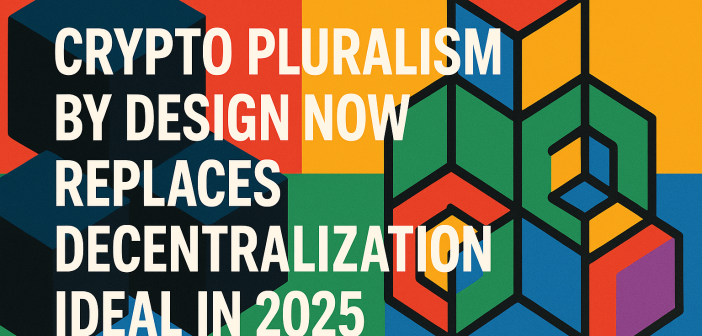The vision of crypto pluralism is rapidly replacing the industry’s long-cherished ideal of decentralization. While decentralization is often invoked in blockchain marketing, the term never appeared in Satoshi Nakamoto’s original 2008 Bitcoin whitepaper. Instead, the focus was on building a peer-to-peer system that replaces institutional trust with publicly verifiable cryptographic proofs.
In reality, decentralization often masks a reorganized hierarchy, where insiders control scarce resources and outsiders provide liquidity. Pluralism, not decentralization, may be the more accurate — and more honest — descriptor of what crypto aims to achieve.
Crypto Pluralism Shifts Focus from Power Removal to Power Redesign
Unlike utopian decentralization, crypto pluralism focuses on making power harder to hide rather than trying to eliminate it. This shift is evident in how modern blockchain structures operate. While miners, validators, and stablecoin treasuries still hold significant influence, their actions can now be observed, verified, and — when necessary — bypassed.
This new power dynamic marks an evolution in crypto’s mission. Instead of aiming to dismantle control, the goal is to restructure it through transparency and accessibility.
Crypto Pluralism Enables Permissionless Innovation
One of the core strengths of crypto pluralism is its capacity to support permissionless finance. Self-custody of digital value, cross-border transfers without SWIFT, and programmable money via smart contracts enable a world where value moves freely, regardless of geography or politics.
A simple 12-word seed phrase can protect assets globally — no bank approval required. Stablecoins, especially those pegged to the U.S. dollar, flow across borders in seconds, often at a fraction of a cent. These features illustrate crypto’s real innovation: reducing the cost and barriers of transacting without asking.
Smart Contracts, Not Slogans, Power the Future
Smart contracts — not marketing slogans — deliver the most meaningful decentralization crypto can offer. These programmable tools convert value into modular infrastructure. Anyone with an internet connection can build a market, not just participate in one.
Under crypto pluralism, what matters is not how widely control is distributed, but how exposed, auditable, and challengeable it remains.
Conclusion: Crypto Pluralism Is the Real Promise
The crypto industry’s progress does not depend on perfect decentralization. It depends on how hard it becomes to hide privilege, not how elegantly a protocol claims to distribute it.
If power structures remain open to challenge and aligned with transparent mathematics, crypto fulfills its promise — not by eliminating authority, but by ensuring it can’t operate in the dark.
That’s not decentralization. That’s crypto pluralism.




